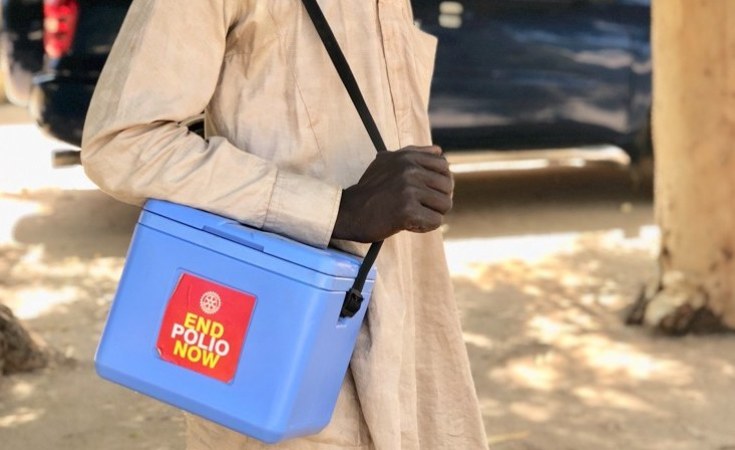Accra — COVID-19 is fuelling a resurgence of vaccine-preventable diseases such as polio globally, but even more so in Sub-Saharan Africa and Asia, experts say.
According to the World Health Organization (WHO), the global polio immunisation coverage among one-year-old children increased from 73 per cent in 2000 to 86 per cent in 2019 only to drop to 80 per cent in 2021. Experts attribute the drop to the negative impacts of the COVID-19 pandemic.
"Up to 17 million likely did not receive a single vaccine during the year, widening already immense inequities in vaccine access," explained the WHO in a statement published in 2021. It said most of those children lived in communities affected by conflict, or in remote or informal settings such as slums, with limited access to basic health and social services.
Health experts are calling for more action to eliminate polio, a viral disease transmitted via coughs and sneezes or objects contaminated with the faeces of an infected person. It can be prevented through vaccination.
If a population is fully immunised, they will be protected against all forms of polioviruses and will not suffer from paralysis, a common effect of the disease.
Polio vaccines
Two types of vaccines exist for fighting polio: Injected Poliovirus Vaccine (IPV), which is given as an injection, and oral poliovirus vaccine (OPV), which is given as drops in the mouth. While IPV contains poliovirus that has been killed off, OPV has an inactivated virus that is incapable of causing a disease, according to a paper published in the journal Ethics, Medicine and Public Health last month (24 November).
The OPV, which is commonly used worldwide, can undergo mutations as it multiplies in the gut, the paper added. While the mutations rarely cause disease in vaccinated people, the vaccine-derived variants known as circulating Vaccine Derived Poliovirus (cVDPV) can cause polio just like Wild Poliovirus (WPV) in unvaccinated people.
The paper highlighted the resurgence of polio types globally. For example, in 2019 cases of cVDPV were reported across only 19 countries but as of April 2022, the number had increased to 33 countries.
Abdulqadir J. Nashwan, a co-author of the paper, told SciDev.Net that most polio cases were reported in regions of Africa in countries such as Chad, the Democratic Republic of Congo and Nigeria.
"These are mostly socioeconomically disadvantaged countries with conflict zones. The re-emergence of polio cases is a fact, and the international community should take immediate action," added Nashwan, director of nursing for education and practice development at Hamad Medical Corporation in Qatar.
Africa's polio eradication setback
Thanks to support from African governments and global donors, the WHO African Region was certified as wild polio-free on 25 August, 2020 by the Africa Regional Certification Commission after four years of not detecting a case.
"Ending wild polio virus in Africa is one of the greatest public health achievements of our time and provides powerful inspiration for all of us to finish the job of eradicating polio globally," said WHO director-general Tedros Adhanom Ghebreyesus, in a statement announcing the feat.
But the WHO also urged countries to continue the fight against polio as type 2 circulating Vaccine Derived Poliovirus (cVDPV2) was still present in 16 countries in the WHO African region.
For example, from 2008 to 2018, Ghana enjoyed polio-free status until an outbreak of cVDPV2 occurred in 2019, according to the international vaccine alliance, Gavi. Between December 2019 and February 2020, the country's health ministry with the support of WHO, Gavi and UNICEF immunised 4.5 million at-risk children in half of the country's 16 regions.
However, in Ghana, as in many places, the COVID-19 pandemic put a halt to immunisation, setting back global polio eradication efforts. Several countries including Malawi and Mozambique, saw a resurgence of the disease.
"Due to restrictions, outreach workers could not visit homes to vaccinate children, and parents could not bring their children to health facilities for immunisations," Nashwan explained.
He added that misinformation and myths related to the impact of vaccines were another contributing factor and funding shortfalls due to the financial crisis that followed COVID-19 also had a part to play.
How to turn the tide
Nashwan is confident that Africa can turn the tide but he cautions: "Despite the existence of vaccines that are constantly improving, their availability alone does not hold the key to the solution."
"As always, immunsation rates are crucial to eradicating polio worldwide. To get there, nations must recognise the virus's potentially crippling physical and economic effects on a population. It's important to dispel vaccine myths and support a stricter vaccination push," he added.
Shiphrah Kuria-Ndiritu, a reproductive, maternal, child and adolescent health expert at Amref Health Africa, agrees.
"There is a need for acceleration targeting those who missed the vaccines and ensuring all the newborns get the vaccines according to schedule," she told SciDev.Net. "African countries need to continue investing in the routine immunisation efforts by building the capacity of the health workers, strengthening the supply chain as well as increasing the demand at the community level.
Increased efforts to provide safe water and sanitation services are also crucial to stop the spread of the virus, she added.
This piece was produced by SciDev.Net's Sub-Saharan Africa English desk.
This article was supported by Global Health Strategies (GHS), an organisation which uses advocacy, communications and policy analysis to improve health and wellbeing around the world.
H.E President Macky Sall, Chairperson of the African Union (AU) and President of the Republic of Senegal, will be hosting the Forum on Immunization and Polio Eradication in Africa on December 10, 2022, in Dakar, Senegal.


